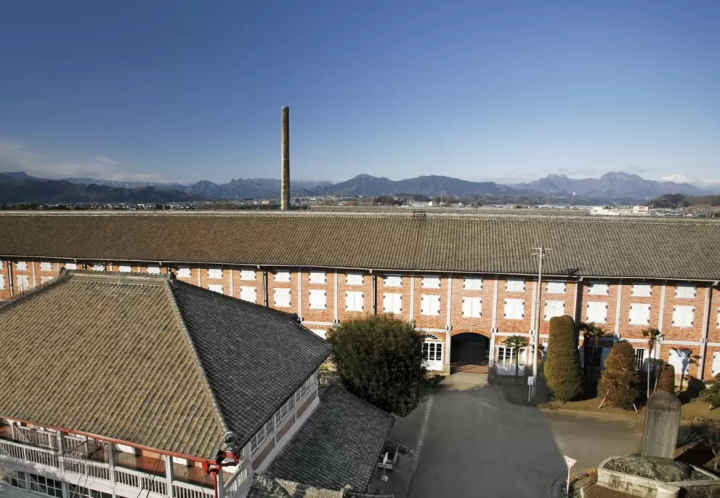Only in Kanazawa - The Tsuzumi Gate and Hospitality Dome

Kanazawa Station has two highlights on its premises: the Tsuzumi Gate and the Hospitality Dome. In this article, we explain the concepts behind their designs.
With castle towns that stand to this day, Ishikawa prefecture is the place to go to experience historical Japanese culture. Ishikawa has plenty of hot spring areas, as well as bountiful fresh seafood, thanks to its location by the Sea of Japan, and it enjoys great popularity with Japanese tourists. Kanazawa city is a particular standout within the prefecture, as the city retains a deep historical imprint; the city is home to places like Kanazawa Castle and the Kenrokuen garden, in addition to samurai villas and the Chayamachi district.
Kanazawa Station is the starting point for most Kanazawa adventures. However, did you know that the station has sightseeing spots in its own right? This time, we will introduce the Tsuzumi Gate and Hospitality Dome.
The Tsuzumi Gate, Symbol of Kanazawa Station
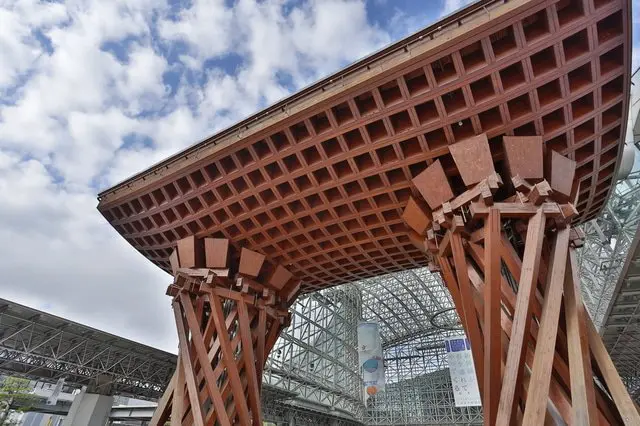
This 13.7 meter-high gate is supported by two thick pillars, and is designed to evoke the image of the tsuzumi, the drums played by hand in Noh theater and Kaga Hosho performances.
*Noh is a representative Japanese performing art which dates back to the 14th century.
*Kaga Hosho is the style of Noh traditionally performed in Ishikawa prefecture, and has been designated as an intangible cultural asset by Kanazawa city
Why was it fashioned after Noh tsuzumi drums? Noh has been embedded in the fabric of Kanazawa life for generations, and is beloved by many people. That affection for Noh tradition continues even today, in the splendid Ishikawa Prefectural Noh Theater and the Kanazawa Noh Museum.
It is said that the designers went with this drum-inspired construction in order to greet visitors with a structure themed around the city’s beloved Noh performances.
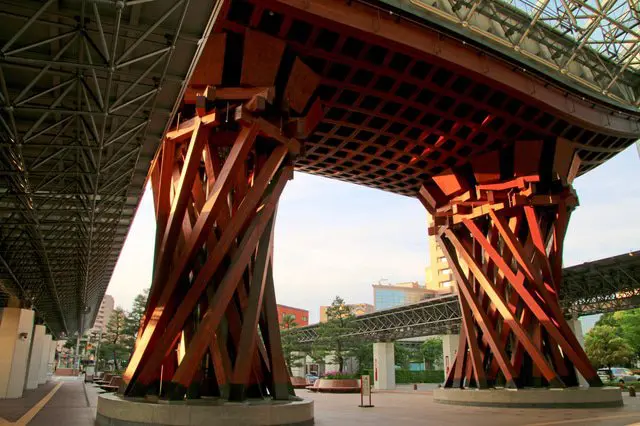
The pillars are made to spiral upwards, then gently curve to connect to the sloping roof, forming the gate’s beautiful shape. The weight of the structure also contains a subtle delicacy, and it is truly marvelous. Another think to note is that the two main pillars house water pipes, so that rain or snow runoff do not collect on the roof; this was devised because of the the frequent snowfall in the area.

When you stop by Kanazawa, before you head to your destination, why not stop at the entrance to Kenrokuen and take a look at the gate for yourself?
Hospitality Dome
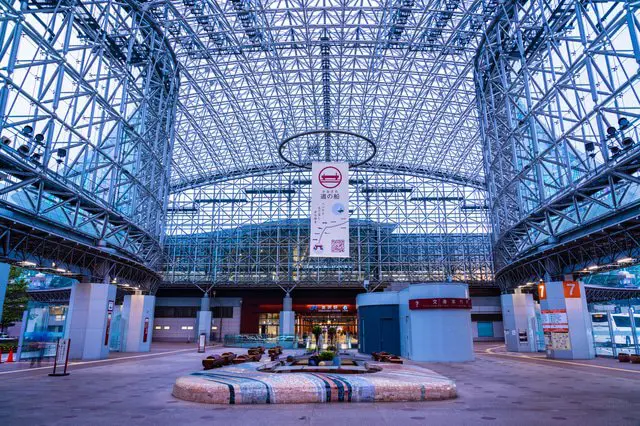
When you get off the train at Kanazawa Station and head towards Kenrokuen, you will soon see this geometrically-patterned glass ceiling. This is actually known as the Hospitality Dome.
Why is it known as the Hospitality Dome? It serves as an umbrella for disembarking passengers, since Kanazawa has frequent rain and snow. This spirit of hospitality is the concept behind the name.
The Hospitality Dome uses 3019 glass panels to create a bright, wide space for visitors while also shielding them from the elements.
In Closing
What do you think of Kanazawa Station’s two special spots? Embodying the heart of the people of Kanazawa, both the gate and the dome were conceived to welcome visitors and symbolize the city’s traditions.
Before you go into the city proper, how about taking ten minutes to see them for yourself?
Read also
Information
Tsuzumi Gate / Hospitality Dome
Address: Ishikawa, Kanazawa, Kinoshinbomachi 1-1
Operating hours: All day
Fixed holidays: None
Closest stations: JR Kanazawa Station, IR (Ishikawa Railways) Kanazawa Station
All Photo by Pixta
Hello, I'm Keisuke. living Asakusa Tokyo Japan. Love triathlon(Ironman), traveling, reading, eating and my job. I really really like Japan but I think Japan should be more kindly to traveler. https://www.facebook.com/keisukeyamada84




![[Accommodation in Kanazawa] Hotel "LINNAS Kanazawa" where you can choose from 10 room types, 2 minutes on foot from Omicho Market!](https://resources.matcha-jp.com/resize/200x2000/2023/06/11-139276.webp)







































![[Southern Oita Prefecture (Usuki and Saiki)] A journey through fermentation and tradition. Oita Sustainable Gastronomy](https://resources.matcha-jp.com/resize/720x2000/2026/02/27-259975.webp)
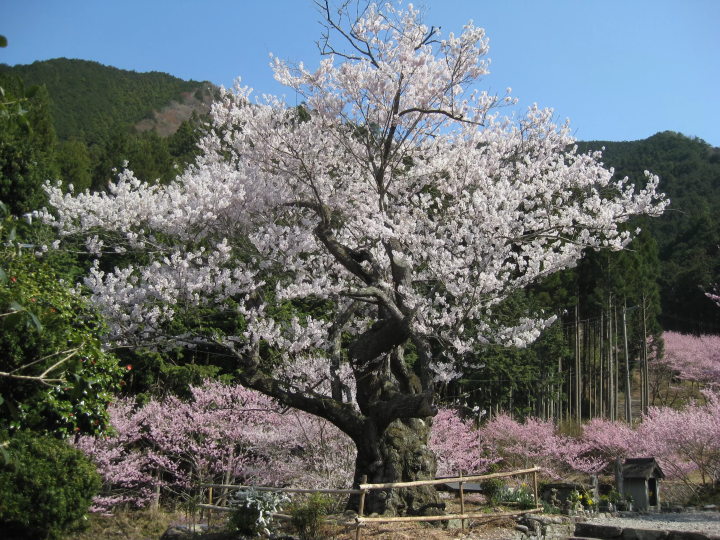
![[Hiroshima] ORIZURU Making at the Hotel / Sheraton Grand Hiroshima Hotel](https://resources.matcha-jp.com/resize/720x2000/2026/02/26-259811.webp)
![[Aichi] 30 minutes from Nagoya! 8 must-see tourist spots in Tokoname, the city of beckoning cats and pottery](https://resources.matcha-jp.com/resize/720x2000/2026/02/26-259808.webp)
